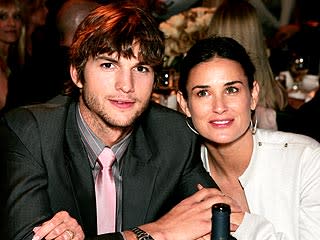Is there a seven-year itch (or a three-year glitch)?

By Chiara Atik for HowAboutWe.com
The Seven-Year Itch (made famous in a 1955 movie, the one where Marilyn Monroe wears a white dress over a subway grate) is the idea that after seven years of a relationship, one or both partners will become disenchanted with the relationship and be tempted to stray. The theory is that after seven years, the honeymoon period is well and truly over: while people will still love their other half, they won't necessarily be as excited about them. They'll start to feel restless. And, as the line in the movie goes, "When something itches, my dear, the natural tendency is to scratch."
Related: The 9 Most Common Excuses For Dumping Someone
A little food for thought: Ashton and Demi have been making headlines recently over rumored marriage troubles, and they've been married for six and a half years. Reese Witherspoon and Ryan Philippe separated after seven years. Jennifer Aniston and Brad Pitt divorced after seven. It seems that among celebrities, the seven-year itch is definitely a trend. Unfortunately for us mere mortals, we may not get a full seven years until boredom sets in...
According to an early 2011 poll, a more apt name for he Seven-Year Itch might be the Three-Year Glitch. Two thousand UK couples who were surveyed showed that small things, which never bothered them in the first years of a relationship, started to get irritating after the three-year mark. Sex also drops dramatically after three years together.
Related: What Should Your "Dating Age Range" Be? This Formula Will Tell You!
Of course this isn't a science. It's ridiculous to think that at the seven-year mark a relationship will suddenly start to wobble. Many relationships end a lot sooner or a lot later than seven years. But the question is, is there an average period of time when two people (who possibly still love each other!) will become a little more...disenchanted? In other words, does the three-year glitch really exist?
Sari Cooper, a couples psychotherapist and sex therapist, says yes.
"It's definitely a real thing," she said. "When you're first dating and you're falling for someone, it's very magical. You can't wait to speak to this person, you're waiting for the next date, there's a certain amount of anxiety. After that first anxiety calms down, people get comfortable. The very qualities that we love about our partners in the beginning of a relationship tend to be the same qualities that drive us crazy later on."
Kristine Gasbarre, author of "How to Love an American Man," agrees.
"I've heard three years is the crossroads: the passion has waned and real life has set in. At three years, couples are making investments together (apartments, cell phone contracts, fancy coffee machines, etc.) but if there's uncertainty on either side about whether the relationship is permanent, feelings of resentment can set in."
So, how can couples who are approaching the three- or seven-year mark avoid itchy symptoms?
Stay curious about your partner. "People assume they know their mates through and through, and because of that assumption, they stop asking each other interesting questions and doing new things together," Cooper says. Don't assume you know everything about your partner: make it a goal to try new experiences with each other, to try and find out things about him or her that you maybe didn't know. You'll find new things about each other that will make you fall in love all over again.
Related: 10 Things That Pretty Much Everyone Is Looking For In A Relationship
Prioritize date night. "Even when you're married, you should still be dating," says Laurie Davis, founder of eFlirtExpert.com. Setting aside time to flirt, dote on each other and plan dates will create a more continuous connection for your relationship."
Remember to appreciate your partner. "Couples' counselors say it all the time: the way to make sure your partner will leave is to forget to appreciate what a great person they are," Gasbarre says.
Don't forget to play together. "I think what happens is that people get really serious if they're emotionally serious and they forget to play with each other, it gets less fun," Cooper says. "The beginning of a relationship is all about fun."
Promise yourself to say committed. It's important not to get too frustrated with yourself or with your partner if you find yourself in a relationship rut. "Make the commitment to yourself and your partner to figure out what it takes to make it better." Cooper says. "It's not going to have the same feeling of when you first met, but it will provide the spark."
Related: 7 Types Of Men Who Won't Make You Happy
